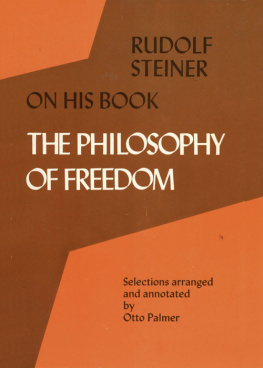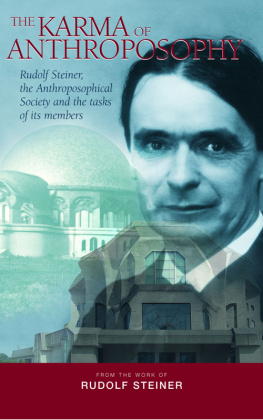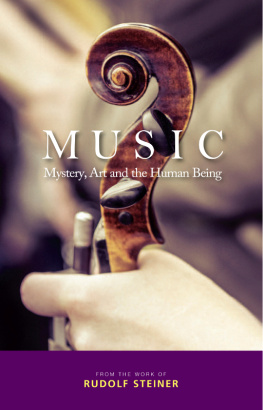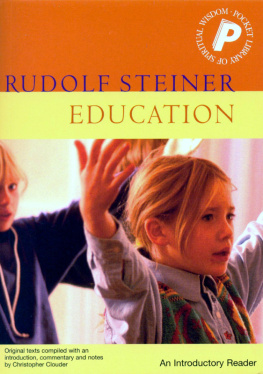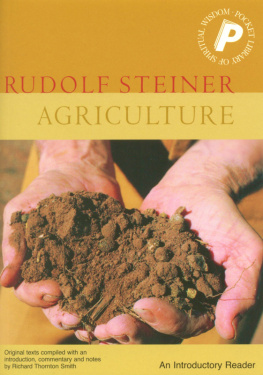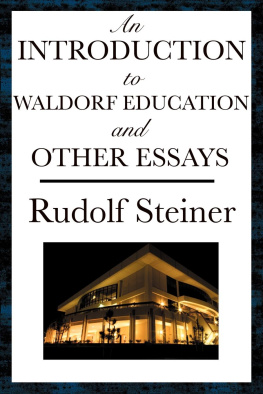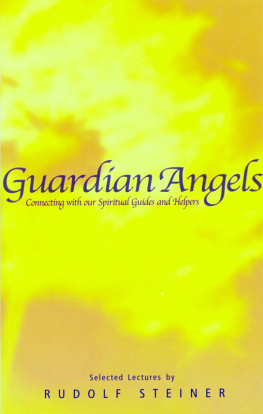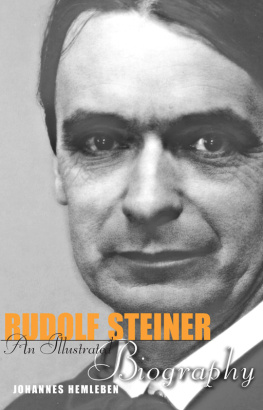
Translated from the original German by Marjorie Spock and published with the kind permission of Verlag Freies Geistesleben, Stuttgart.
Copyright 1975
by Anthroposophic Press, Inc.
Permission to quote from works of Rudolf Steiner granted by the Rudolf Steiner Nachlassverwaltung, Dornach, Switzerland.
Printed in the United States of America
CONTENTS
Dedicated to
The Community of Free Spirits
for whom Rudolf Steiner wrote.
Introduction
More than seventy years have passed since the first appearance of The Philosophy of Freedom. After that, a quarter of a century elapsed before Rudolf Steiner made up his mind to bring out a second edition of the book. It would have been possible to keep on publishing new editions, he said at the time, and I don't doubt they would have found a market. But that would just have meant only that The Philosophy of Freedom sold well. In the case of my more basic writings I was never interested in having lots of copies floating around the world. My real concern was to have these writings understood and the impulse in them actually working.
Many further editions have been published since these words were spoken. The time now seems ripe to bring together what Rudolf Steiner himself said and wrote by way of furthering an understanding of this book and of the goal he intended it to serve.
No other book Rudolf Steiner wrote was as often and exhaustively discussed by him as The Philosophy of Freedom. He not only refers to it, as in the case of others of his writings, to call attention to some particularly interesting matter treated in its pages; he points again and again and yet again, from every imaginable angle, to what he intended this work to accomplishindeed, to initiate. The reader will see from the chronological listing of Steiner's comments included at the end of this volume that from 1905 until his death in 1925 not a year passed without some discussion of this first work. The list does not pretend to be complete, however. It would have to include many further references to achieve the status of a true archive, but that task can be undertaken at leisure. Meanwhile, the listing in the appended table may be regarded as containing the most basic references.
The Philosophy of Freedom is a path, a method, as anthroposophy itself isa method leading by philosophic means to the actual experience of a thinking detached from the body-soul makeup. This is a thinking that cannot be allowed to remain mere thought but must instead become experience based on soul observation as the subtitle of the book indicates. As such, it is the first stage of supersensible experience. The second is moral intuition, described in the section called Moral Fantasy.
Experience of the kind referred to offers the only possible means of refuting materialism, both the scientific materialism of the West and the dialectical materialism of the East. They cannot be refuted by pure logic, for in the closed circuit of the thought systems on which they are based both types have built themselves impregnable fortresses. There is not the tiniest loophole through which one might creep to threaten their hold. They can only be countered by the most solid experience, by the actual fact of experiencing the supersensible in the thinking process. One cannot argue about that experience with people unwilling or unable to attain it, anymore than one can argue with a blind man about the light and color that his defective organism keeps him from perceiving. The experience of pure thinking remains a matter of having the goodwill, as The Philosophy of Freedom says, to undertake it.
The shape of the future depends entirely upon how the human race thinks today. The way we think about ourselves conditions what we will become. Angelus Silesius said, Man, what thou lovest, into that art thou translated. Lovest thou God, God thou becomest, and earth thou becomest, lovest thou earth. Nowadays it is not so much what we love that is the decisive element as what we think. We take on the shape of the image formed by the way we think about ourselves. So we might change the Silesian mystic's saying to Man, what thou thinkest, into that art thou transformed. Thinkest thou spirit, spirit thou becomest, and beast thou becomest, conceivest thou thyself as a mere body.
The question as to which is right, the materialistic view of man and universe or the spiritual one, is not primarily theoretical; it is a question we must settle with our wills. Do we want man to be a threefold being endowed with body, soul and spirit, or just a body and soul with a few spiritual attributes? Or is a body with a few soul attributes all we really want? It is up to man alone to decide this issue.
A person able to understand this can also see that The Philosophy of Freedom, which poses this world historic problem, thereby lifts itself out of the realm of mere theory to take its rightful place among the decisive factors affecting mankind's future evolution, for it becomes the means to a practical rather than a theoretical overcoming of materialism.
This book offers those who study it the possibility of making themselves truly free spirits. Materialism does just the opposite. It seeks to reduce us to creatures completely determined by heredity and other such influences, hence totally unfree and little better than animals. That is what materialism has set out to do, and let us not deceive ourselves; it can do it.
Anyone anxious to participate in shaping future man into a spiritually threefold being will have to activate his thinking, to set himself inwardly in motion. Following a path means moving one's feet, not standing still. If one cannot rouse oneself to do this, one resembles a person who studies a map carefully and knows exactly where the path goes, but never starts out to travel it. The map is all that interests him.
The Philosophy of Freedom can, of course, be taken just this way; what would become of freedom were it otherwise?
Nevertheless, to read it that way means taking a more theoretical approach to the study of the path Steiner opened up. That is perfectly justified within certain limits. But there is a danger in itthe danger of becoming too much involved in following up the quotes from Spinoza, Fichte, Hamerling and the various others and making them more of an object of study than is at all necessary for a grasp of The Philosophy of Freedom. Such a procedure is quite proper, however, in the case of Steiner's book The Riddles of Philosophy because of that book's more historical character.
The quotations included in The Philosophy of Freedom were put there for a quite different purpose. That purpose stands out clearly if we leave out the names of the philosophers quoted and consider their thoughts alone, a procedure that changes nothing of consequence in the structure of the book. Then these thoughts serve partly as an obstacle course for the strengthening of our own thinking, partly as prods to stimulate us to reach out for new ideas, and partly as fences to keep our thoughts from straying off in wrong directions. These various goals are fully served by the extent of Steiner's quoting, a fact that relieved him of the necessity of coming to grips within the confines of this book with contemporary developments of philosophic thought. As he said, There is no need to deal with them in a book with the particular purpose I intended this to serve. These words were followed by a reference to The Riddles of Philosophy, which does deal fully with them.
If one responds, as suggested above, to the tutelage the quotes provide, one begins to notice that the thoughts presented in this book are not arranged in a set abstract logical sequence, but instead conduce to a thought dynamics, a veritable thought eurythmy. What we have here is philosophy as an art of thinking.
Next page
